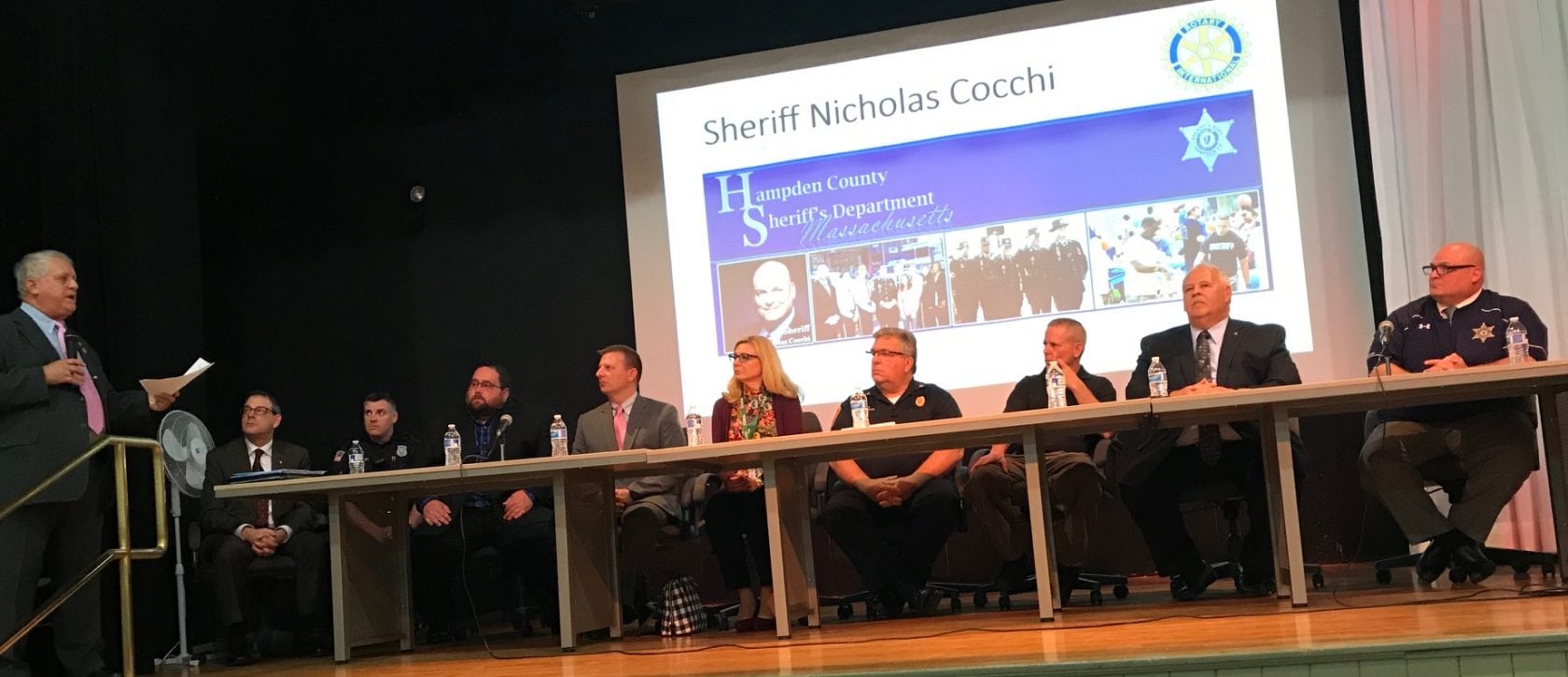
A panel of nine people spoke during the opioid forum on Wednesday night. (Photo by Greg Fitzpatrick)
SOUTHWICK – The Southwick Rotary Club hosted an opioid forum on Wednesday night at the Southwick Town Hall.
The forum featured a panel of nine guest speakers and headlining the panel was Hampden County Sherriff Nick Cocchi. Alongside Cocchi was Southwick Police Chief David Ricardi, Sgt. Det. Robert Landis, school resource officer Joe Taggart, Schools Superintendent Jen Willard, Southwick Regional School Principal Joe Turmel, Southwick Fire Chief Russ Anderson, Select Board Chairman Doug Moglin, and Courtney Rex of the Michael Diaz Foundation.
Each of the nine guest speakers addressed the crowd. Cocchi started by emphasizing the impact the opioid epidemic has had.
“To see the people here tonight, it only puts an exclamation point on how much this affects people,” said Cocchi.
Cocchi went on to say that he’s working on having Section 35 available in Hampden County. A Section 35 is when a person commits to going to a treatment facility for abusing drugs or alcohol. The sherriff wants to work on helping these people that are hooked on opioids and offering them treatment.
“When everyone talks about the opioid crisis, they talk about money,” said Cocchi. “It costs money to save lives.”
Cocchi added a story about his early days in law enforcement and having several incidents with the same guy who had been an opioid addict and would go to jail time after time. For years now, that same guy has been away from jail and living a healthy life. It’s an example like that in which Cocchi wants to see more of.
“I want to give you hope about second chances, third chances, and fourth chances,” said Cocchi.
Ricardi spoke about the impact implementing Narcan can have for a community. Since introducing Narcan to Southwick on January 29, 2016, the police have saved three people in 2016 and seven more in 2017.
Sgt. Det. Landis spends a lot of his time during investigations speaking to people on opioids and listening to their stories. He said that there’s a lot more hardship than people realize. While the drugs can be cleaned from their system in a week, it’s not the physical aspect of drugs that can have the biggest effect.
“It’s the emotional train that’s long term,” said Landis.
Fire Chief Russ Anderson also provided more statistics for those in attendance to gain insight on the crisis.
From the findings of the Southwick Fire Department, fire personnel responded to 11 overdoses in 2015, but responded to 34 overdoses in 2016, and 30 in 2017.
Anderson also noted that the incidents involving opioids have evolved over time.
“We’re starting to see accidents involving overdoses,” said Anderson. “The epidemic is more mobile now.”
In order to crack down on the opioid problem, a major factor is getting into the schools and engaging the students. Turmel said that they have numerous types of programs and initiatives. This includes requiring every student from grades nine through 12 to take a health class, have health intervention screenings, and also inviting guest speakers to talk with the students.
Taggart wanted to remind parents that they need to always be aware of what their kids are doing in their rooms and who they’re hanging out with. He added that kids at a young age will develop bad habits.
“Don’t think you’re doing any favors by being their friend or giving them privacy,” said Taggart.
Courtney Rex offered a different angle than anyone else on the panel; being a former opioid addict himself.
Rex’s father passed away after a battle with drugs and his mom has been recovering for 20 years. Because of this Rex never thought it would happen to him.
“I swore growing up that I was never going to grow up like them,” said Rex.
Rex wanted to remind people that becoming an addict can happen much quicker than people think.
“Addiction is a progressive path,” said Rex. “Before you know it, you’re a full-blown heroin addict, it’s a vicious cycle.”
Acknowledging that he’s now four and a half years sober, Rex noted that the battle is still there and always will be.
“I have to work at this every single day for the rest of my life,” said Rex.
Prior to the guest speakers on the panel, people in attendance had the opportunity to look at numerous organizations that had exhibits on display that help people going through an opioid problem. This includes the Southwick Health Department, One Call Away, ADCARE outpatient addiction services, Narcotics Anonymous 12-step recovery program, New England Adventures, From the Ground Up, and Learn to Cope, a state- funded agency.





